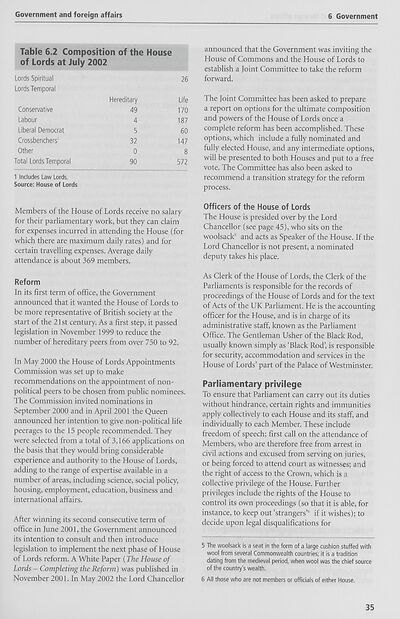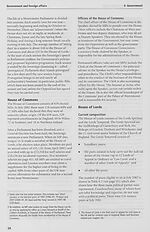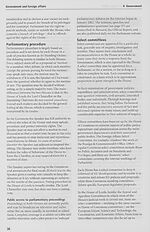Download files
Complete book:
Individual page:
Thumbnail gallery: Grid view | List view

Government and foreign affairs
6 Government
Table 6.2 Composition of the House
of Lords at July 2002
Lords Spiritual 26
Lords Temporal
Hereditary Life
Conservative 49 170
Labour 4 187
Liberal Democrat 5 60
Crossbenchers1 32 147
Other 0 8
Total Lords Temporal 90 572
1 Includes Law Lords.
Source: House of Lords
Members of the House of Lords receive no salary
for their parliamentary work, but they can claim
for expenses incurred in attending the House (for
which there are maximum daily rates) and for
certain travelling expenses. Average daily
attendance is about 369 members.
Reform
In its first term of office, the Government
announced that it wanted the House of Lords to
be more representative of British society at the
start of the 21st century. As a first step, it passed
legislation in November 1999 to reduce the
number of hereditary peers from over 750 to 92.
In May 2000 the House of Lords Appointments
Commission was set up to make
recommendations on the appointment of non¬
political peers to be chosen from public nominees.
The Commission invited nominations in
September 2000 and in April 2001 the Queen
announced her intention to give non-political life
peerages to the 15 people recommended. They
were selected from a total of 3,166 applications on
the basis that they would bring considerable
experience and authority to the House of Lords,
adding to the range of expertise available in a
number of areas, including science, social policy,
housing, employment, education, business and
international affairs.
After winning its second consecutive term of
office in June 2001, the Government announced
its intention to consult and then introduce
legislation to implement the next phase of House
of Lords reform. A White Paper (The House of
Lords - Completing the Reform) was published in
November 2001. In May 2002 the Lord Chancellor
announced that the Government was inviting the
House of Commons and the House of Lords to
establish a Joint Committee to take the reform
forward.
The Joint Committee has been asked to prepare
a report on options for the ultimate composition
and powers of the House of Lords once a
complete reform has been accomplished. These
options, which include a fully nominated and
fully elected House, and any intermediate options,
will be presented to both Houses and put to a free
vote. The Committee has also been asked to
recommend a transition strategy for the reform
process.
Officers of the House of Lords
The House is presided over by the Lord
Chancellor (see page 45), who sits on the
woolsack5 and acts as Speaker of the House. If the
Lord Chancellor is not present, a nominated
deputy takes his place.
As Clerk of the House of Lords, the Clerk of the
Parliaments is responsible for the records of
proceedings of the House of Lords and for the text
of Acts of the UK Parliament. He is the accounting
officer for the House, and is in charge of its
administrative staff, known as the Parliament
Office. The Gentleman Usher of the Black Rod,
usually known simply as ‘Black Rod’, is responsible
for security, accommodation and services in the
House of Lords’ part of the Palace of Westminster.
Parliamentary privilege
To ensure that Parliament can carry out its duties
without hindrance, certain rights and immunities
apply collectively to each House and its staff, and
individually to each Member. These include
freedom of speech; first call on the attendance of
Members, who are therefore free from arrest in
civil actions and excused from serving on juries,
or being forced to attend court as witnesses; and
the right of access to the Crown, which is a
collective privilege of the House. Further
privileges include the rights of the House to
control its own proceedings (so that it is able, for
instance, to keep out ‘strangers’6 if it wishes); to
decide upon legal disqualifications for
5 The woolsack is a seat in the form of a large cushion stuffed with
wool from several Commonwealth countries; it is a tradition
dating from the medieval period, when wool was the chief source
of the country's wealth.
6 All those who are not members or officials of either House.
35
6 Government
Table 6.2 Composition of the House
of Lords at July 2002
Lords Spiritual 26
Lords Temporal
Hereditary Life
Conservative 49 170
Labour 4 187
Liberal Democrat 5 60
Crossbenchers1 32 147
Other 0 8
Total Lords Temporal 90 572
1 Includes Law Lords.
Source: House of Lords
Members of the House of Lords receive no salary
for their parliamentary work, but they can claim
for expenses incurred in attending the House (for
which there are maximum daily rates) and for
certain travelling expenses. Average daily
attendance is about 369 members.
Reform
In its first term of office, the Government
announced that it wanted the House of Lords to
be more representative of British society at the
start of the 21st century. As a first step, it passed
legislation in November 1999 to reduce the
number of hereditary peers from over 750 to 92.
In May 2000 the House of Lords Appointments
Commission was set up to make
recommendations on the appointment of non¬
political peers to be chosen from public nominees.
The Commission invited nominations in
September 2000 and in April 2001 the Queen
announced her intention to give non-political life
peerages to the 15 people recommended. They
were selected from a total of 3,166 applications on
the basis that they would bring considerable
experience and authority to the House of Lords,
adding to the range of expertise available in a
number of areas, including science, social policy,
housing, employment, education, business and
international affairs.
After winning its second consecutive term of
office in June 2001, the Government announced
its intention to consult and then introduce
legislation to implement the next phase of House
of Lords reform. A White Paper (The House of
Lords - Completing the Reform) was published in
November 2001. In May 2002 the Lord Chancellor
announced that the Government was inviting the
House of Commons and the House of Lords to
establish a Joint Committee to take the reform
forward.
The Joint Committee has been asked to prepare
a report on options for the ultimate composition
and powers of the House of Lords once a
complete reform has been accomplished. These
options, which include a fully nominated and
fully elected House, and any intermediate options,
will be presented to both Houses and put to a free
vote. The Committee has also been asked to
recommend a transition strategy for the reform
process.
Officers of the House of Lords
The House is presided over by the Lord
Chancellor (see page 45), who sits on the
woolsack5 and acts as Speaker of the House. If the
Lord Chancellor is not present, a nominated
deputy takes his place.
As Clerk of the House of Lords, the Clerk of the
Parliaments is responsible for the records of
proceedings of the House of Lords and for the text
of Acts of the UK Parliament. He is the accounting
officer for the House, and is in charge of its
administrative staff, known as the Parliament
Office. The Gentleman Usher of the Black Rod,
usually known simply as ‘Black Rod’, is responsible
for security, accommodation and services in the
House of Lords’ part of the Palace of Westminster.
Parliamentary privilege
To ensure that Parliament can carry out its duties
without hindrance, certain rights and immunities
apply collectively to each House and its staff, and
individually to each Member. These include
freedom of speech; first call on the attendance of
Members, who are therefore free from arrest in
civil actions and excused from serving on juries,
or being forced to attend court as witnesses; and
the right of access to the Crown, which is a
collective privilege of the House. Further
privileges include the rights of the House to
control its own proceedings (so that it is able, for
instance, to keep out ‘strangers’6 if it wishes); to
decide upon legal disqualifications for
5 The woolsack is a seat in the form of a large cushion stuffed with
wool from several Commonwealth countries; it is a tradition
dating from the medieval period, when wool was the chief source
of the country's wealth.
6 All those who are not members or officials of either House.
35
Set display mode to:
![]() Universal Viewer |
Universal Viewer | ![]() Mirador |
Large image | Transcription
Mirador |
Large image | Transcription
The item on this page appears courtesy of Office for National Statistics and may be re-used under the Open Government Licence for Public Sector Information.
| Britain and UK handbooks > UK: The official yearbook of the United Kingdom of Great Britain and Northern Ireland > 2003 > (49) |
|---|
| Permanent URL | https://digital.nls.uk/204923744 |
|---|
| Attribution and copyright: |
|
|---|---|
| Description | Three volumes of 'UK: The official yearbook of the United Kingdom of Great Britain and Northern Ireland', published annually by the Office of National Statistics from 2002-2005. |
|---|---|
| Shelfmark | GII.11 SER |
| Description | Three titles produced by the British Government from 1954-2005 describing 'how Britain worked'. They are: 'Britain: An official handbook' (1954-1998), 'Britain: The official yearbook of the United Kingdom' (1999-2001), and 'UK: The official yearbook of the United Kingdom of Great Britain and Northern Ireland' (2002-2005). These 50 reports provide an overview of Britain's economic, social and cultural affairs, its environment, international relations, and the systems of government. They give an impartial summary of government policies and initiatives, and explain how public services are organised. |
|---|---|
| Additional NLS resources: |
|

